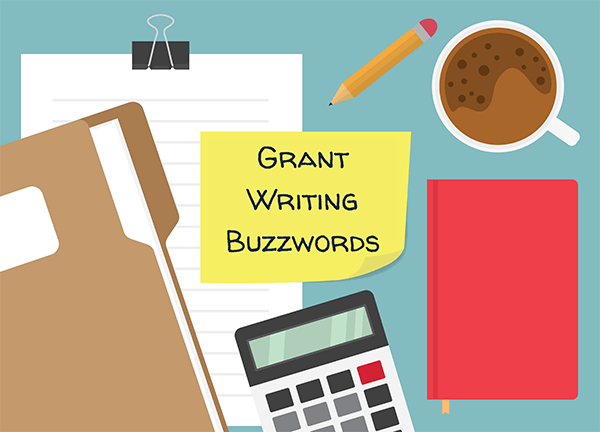When it comes to grants – grant proposals, grant management, really any grant writing services – there is a universal tongue that you, as a nonprofit leader, must become comfortable with. You must be able to, at essentially the drop of a hat, spit out a passionate but also articulate, knowledgeable, suitable, and detailed bit of information.
You know your organization, and you know it well, so surely you won’t stumble over your answers when talking to your grant writer. Just in case, though, we’ve compiled a list of typical grant writing buzzwords and what exactly they’re asking of you.

- Mission – We’ll start easy. You know your mission in and out. Be prepared to describe your organization’s specific mission and how you work each day to fulfill it.
- History – What inspired your organization’s founding? What have been the major milestones since? Has your organization received any recognition for its efforts? Be able to provide success stories to demonstrate your capabilities.
- Funding – How have you sustained your organization thus far? Do you have/who are your major contributors? How do you fundraise? Email marketing? Social media?
- Need – Can you show a significant need for your organization’s programs within the community you serve? Research statistical data on the problem you address, and the degree of other efforts being made to combat the same problem. Numbers are, and data are your friend.
- Capabilities – Are you able to promote members of your board or staff as responsible, knowledgeable nonprofit professionals? Be prepared to describe their education and experience. Convince your audience that they are competent leaders.
- Objectives – Know the difference between a goal and an objective. You must be able to provide measurable objectives!
- Methods – Do you really know, step-by-step, how you will meet those objectives? Are you aware of everything and everyone that will be involved, down to the smallest detail?
- Evaluation – How will you evaluate the success of your proposed project? Take the time to develop a scientific plan for evaluation and know who will be involved and what cost will be incurred.
- Sustainability – You must think past the grant award period. Exactly how will you continue to fund this project once the grant funds run out? They want to hear that you have a plan.
- Budget – Learn to develop a detailed line-item budget. Know the difference between an operating budget and a project budget (it’s not as fancy as you’re thinking) and learn how to allocate your administrative costs within each program.
- Compliance – Be sure that your organization is up to date with all state and federal regulatory compliance requirements. If your organization is behind on required filings, a funder may believe the organization is not well managed enough to administer any funding received appropriately. Prepare evidence of good standing with the state, registration for solicitation of contributions, and 501(c)(3) exemption. Be sure the board is independent and represents a cross-section of the constituency you serve. Make sure all past 990s are readily available and know that 990Ns will not satisfy a grant funder.
So now that you’re refreshed on how to communicate your organization’s mission and accomplishments properly, you’ll need to explore the various types of grants available, including foundation grants, federal grants, and other government grants.
For most organizations, foundation grants are the best entry point into the grant arena. Federal and other government grants require much more work and experience. They often require matching funds, so typically, those opportunities are best suited for nonprofits further into their life cycle.
Here at BryteBridge, we know that identifying a specific grant can be a daunting task. Having the right tools for research can significantly reduce the time and effort allocated to funding research, allowing you to dedicate more of your valuable time to fulfilling your mission. Our grant professionals have the tools to conduct quality funder research, identifying the opportunities that may best fit your organization based on your unique circumstances. Retaining a professional grant writing service is often an excellent way to invest in your capacity-building effort, with great return.
If you’re interested in learning more, feel free to read about our grant services here.



